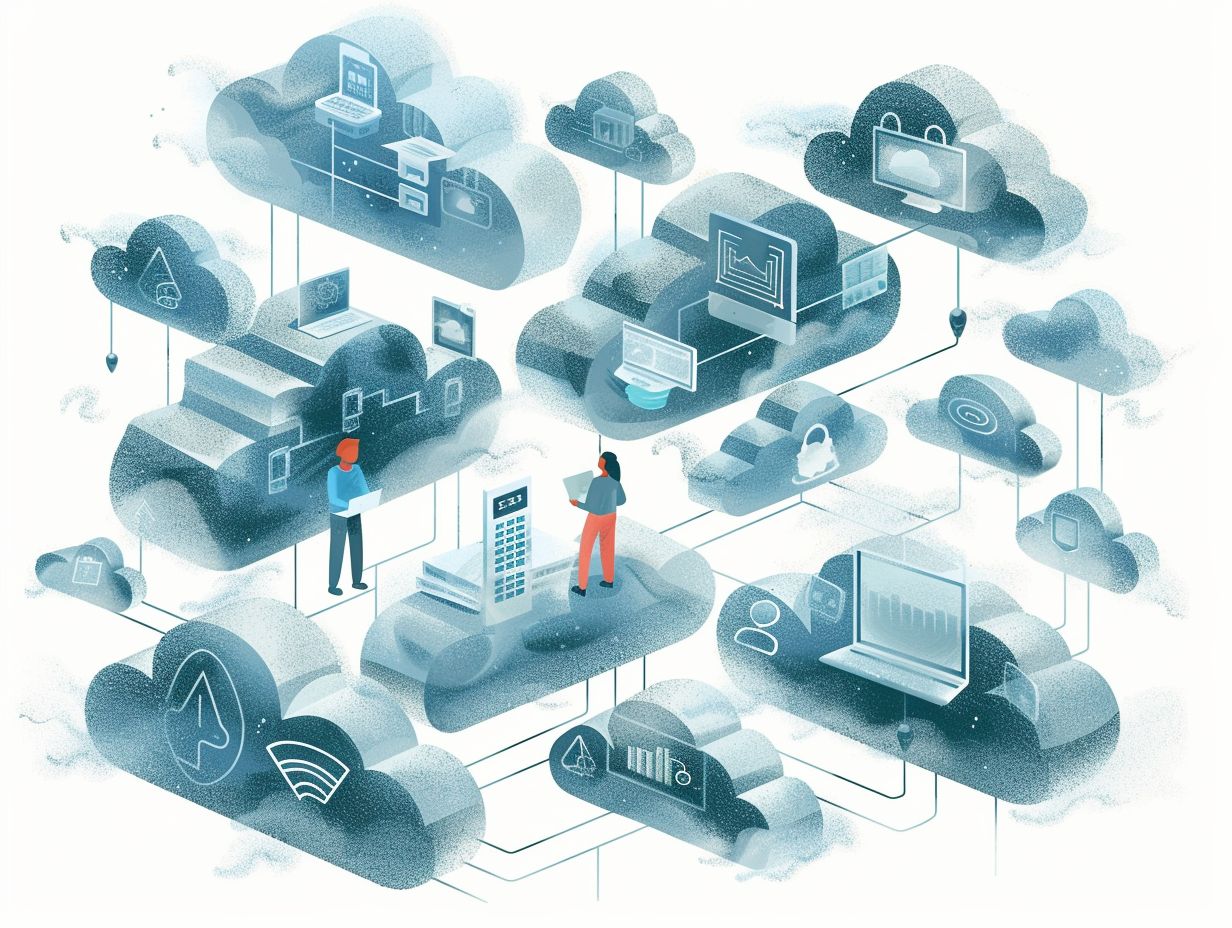Interested in learning more about the buzz around cloud computing and DevOps? This article will break down the key terms, explore the various benefits like efficiency and cost savings, and discuss the critical roles of collaboration and automation.
The implementation process will be thoroughly examined, focusing on key steps and considerations. Common challenges encountered in cloud computing for non-technical professionals and DevOps will be addressed, along with effective solutions.
Future trends and technologies that are shaping the industry and their potential impact on businesses will also be touched upon. Let’s delve into the details!
Key Takeaways:

Defining Key Terms
In the realm of technology and software development, understanding key terms like DevOps is crucial for professionals in the industry. DevOps, a methodology that combines software development (Dev) with IT operations (Ops), focuses on shortening the systems development life cycle and providing continuous delivery with high software quality.
By bridging the gap between developers and operations teams, DevOps aims to create a culture of collaboration and shared responsibility in the software development process. One of the core principles of DevOps is automation, wherein tasks that were traditionally done manually are automated to increase efficiency and reduce errors. This leads to faster deployment times, shorter feedback loops, and improved overall productivity within organizations.
The benefits of implementing DevOps include increased deployment frequency, faster time to market, and better alignment of IT goals with business objectives. This methodology has transformed the way software is developed, enabling companies to respond quickly to market demands and deliver value to customers in a more agile and efficient manner.
Benefits of Cloud Computing and DevOps
The integration of DevOps practices with cloud computing solutions presents a multitude of advantages for businesses in terms of efficiency, collaboration, and automation. By harnessing the capabilities of the cloud and embracing DevOps methodologies, organizations can improve their software development and operational processes.
Efficiency and Cost Savings
The incorporation of DevOps and cloud computing in companies offers significant advantages in terms of efficiency and cost savings. By implementing streamlined processes, improved quality assurance techniques, and the use of key performance indicators, businesses can optimize their operations and reduce overall expenses.
When DevOps principles are seamlessly integrated with cloud technologies, organizations can dynamically scale their infrastructure to meet evolving demands promptly. This integration creates a collaborative environment where development, operations, and IT teams collaborate to drive continuous improvement and innovation. Through the utilization of automated testing and monitoring tools within the cloud environment, companies can improve the quality of their software products and services, leading to increased customer satisfaction and decreased time-to-market.
Collaboration and Automation

The synergy between DevOps and cloud computing gives rise to fundamental aspects such as collaboration and automation. Integrating teams, adopting efficient approaches, and implementing automated processes can significantly enhance productivity and operational effectiveness.
Combining the expertise of cross-functional teams and fostering a cohesive environment allows organizations to streamline their software development and deployment cycles. Strategic coordination among developers, operations, and other stakeholders helps align goals, reduce errors, and accelerate time-to-market. Leveraging automation tools like Ansible, Kubernetes, and Jenkins further amplifies these benefits, enabling continuous integration and delivery. This synergy not only optimizes resource utilization but also enhances scalability and resilience in a rapidly evolving digital landscape.
Implementing Cloud Computing and DevOps
When implementing cloud computing and DevOps technologies, you need to take a strategic approach that aligns with industry standards. Companies should invest in training their professionals to guarantee a seamless transition to adopting these advanced methodologies.
Key Steps and Considerations
Implementing cloud computing and DevOps involves key steps such as restructuring your existing processes, establishing a robust organizational structure, and enhancing the skills of your professionals to meet the demands of these innovative technologies.
One crucial aspect of process restructuring is identifying legacy systems that may not be compatible with cloud environments and adapting them accordingly. Organizing cross-functional teams within your organizational structure can facilitate seamless collaboration between different departments and ensure alignment with DevOps principles. Skill development plays a vital role in this transformation, requiring your professionals to upskill in areas such as automation, continuous integration/continuous deployment (CI/CD), and containerization technologies. By integrating these essential components, organizations can successfully drive technological restructuring and skills enhancement to maximize the benefits of cloud computing and DevOps.
Challenges and Solutions in Cloud Computing and DevOps
When adopting cloud computing and DevOps, you may encounter challenges associated with changing disciplines, redefining roles, and overcoming barriers to implementation. Nevertheless, with the appropriate strategies and solutions, these obstacles can be efficiently resolved.
Common Obstacles and How to Overcome Them

Engineers, analysts, and administrators often encounter common obstacles when transitioning to cloud computing and DevOps practices. Overcoming these challenges requires a combination of technical expertise, analytical skills, and effective communication within teams.
Adapting to the dynamic nature of cloud environments and integrating DevOps principles can introduce complexities in workflow management. Professionals may encounter difficulties in moving from traditional infrastructure to cloud-native solutions, leading to challenges in scalability and security. The cultural shift towards automation and collaboration may face resistance from team members.
To navigate these hurdles, individuals must commit to continuous learning and skill development, cultivating a culture of experimentation and knowledge-sharing within the organization.
Future of Cloud Computing and DevOps
The future of cloud computing and DevOps is on the verge of substantial advancements, propelled by emerging concepts and technologies. As organizations aim for heightened efficiency and agility in their processes, the incorporation of these methodologies will serve as a crucial factor in molding the industry landscape.
Emerging Technologies and Trends
Incorporating innovative infrastructure solutions and adopting microservices architecture are key trends in DevOps and cloud computing. These advancements are transforming the approach that companies take towards software development and operational scalability.
Utilizing microservices architecture allows organizations to enhance agility and scalability in their applications, enabling them to promptly respond to market demands and opportunities.
The evolution of containerization technologies such as Docker and Kubernetes has brought about a significant shift in how software is deployed and managed in distributed environments.
Furthermore, the implementation of Continuous Integration/Continuous Deployment (CI/CD) pipelines is essential for automating the software delivery process. This automation facilitates quicker time-to-market and fosters improved collaboration between development and operations teams.
Potential Impact on Businesses
The potential impact of DevOps and cloud computing on your business can be profound. Specifically, these technologies can streamline operations by adopting automated deployments and continuous integration/continuous deployment (CI/CD) practices. This transformation can enable your company to achieve higher levels of efficiency, agility, and competitiveness in the market.
By embracing the principles of DevOps and utilizing the scalability of cloud infrastructure, your organization can significantly reduce development cycles, shorten time-to-market for new products and services, and improve collaboration between development and operations teams. The seamless integration of DevOps tools and cloud platforms ensures rapid, reliable, and consistent delivery of software applications, enabling your business to respond swiftly to changing market demands and customer needs. The automation of testing, deployment, and monitoring processes can lead to enhanced quality control, increased productivity, and cost savings, positioning your company at the forefront of the digital era.
Frequently Asked Questions

What is the difference between Cloud Computing and DevOps?
Cloud Computing refers to the delivery of computing services, such as storage, servers, databases, software, and networking, over the internet. DevOps, on the other hand, is a set of practices that combines software development (Dev) and IT operations (Ops) to improve collaboration and speed up the software delivery process.
What are the benefits of using Cloud Computing and DevOps together?
By combining Cloud Computing and DevOps, organizations can achieve faster time to market, increased efficiency, improved collaboration, and cost savings. This is because Cloud Computing provides a flexible and scalable infrastructure, while DevOps enables faster development, testing, and deployment of software.
What are some popular Cloud Computing platforms?
Some popular Cloud Computing platforms include Amazon Web Services (AWS), Microsoft Azure, Google Cloud Platform, IBM Cloud, and Salesforce. Each of these platforms offers a range of services and features to support different business needs.
How does DevOps improve the software development process?
DevOps emphasizes automation, collaboration, and communication between development and operations teams. This results in faster and more frequent releases, improved quality of software, and better alignment with business goals.
Do I need to have technical knowledge to understand Cloud Computing and DevOps?
While technical knowledge can be helpful, it is not necessary to understand the basics of Cloud Computing and DevOps. Both concepts can be easily understood by beginners, and there are many resources available online to help you learn more about them.
Can I use Cloud Computing and DevOps for my personal projects?
Yes, you can use Cloud Computing and DevOps for personal projects as well. There are many free and low-cost options available for individuals, such as AWS Free Tier and Azure Free Account. This allows you to experiment and learn more about these concepts without a significant financial commitment.
